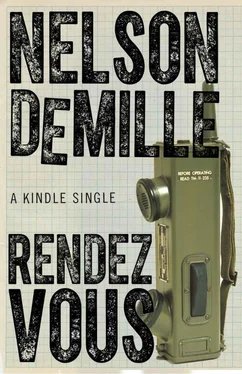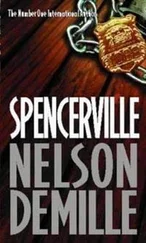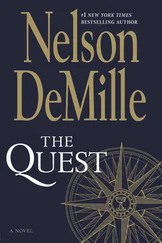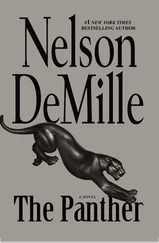Nelson Demille - Rendezvous
Здесь есть возможность читать онлайн «Nelson Demille - Rendezvous» весь текст электронной книги совершенно бесплатно (целиком полную версию без сокращений). В некоторых случаях можно слушать аудио, скачать через торрент в формате fb2 и присутствует краткое содержание. Жанр: Триллер, на английском языке. Описание произведения, (предисловие) а так же отзывы посетителей доступны на портале библиотеки ЛибКат.
- Название:Rendezvous
- Автор:
- Жанр:
- Год:неизвестен
- ISBN:нет данных
- Рейтинг книги:4 / 5. Голосов: 1
-
Избранное:Добавить в избранное
- Отзывы:
-
Ваша оценка:
- 80
- 1
- 2
- 3
- 4
- 5
Rendezvous: краткое содержание, описание и аннотация
Предлагаем к чтению аннотацию, описание, краткое содержание или предисловие (зависит от того, что написал сам автор книги «Rendezvous»). Если вы не нашли необходимую информацию о книге — напишите в комментариях, мы постараемся отыскать её.
Rendezvous — читать онлайн бесплатно полную книгу (весь текст) целиком
Ниже представлен текст книги, разбитый по страницам. Система сохранения места последней прочитанной страницы, позволяет с удобством читать онлайн бесплатно книгу «Rendezvous», без необходимости каждый раз заново искать на чём Вы остановились. Поставьте закладку, и сможете в любой момент перейти на страницу, на которой закончили чтение.
Интервал:
Закладка:
Nelson Demille
Rendezvous
As I learned in high school biology, the female of the species is often more dangerous than the male. Maybe that was true in the animal kingdom, I remember thinking, but with human beings, the male was more dangerous.
I changed my mind about this when I crossed paths with a very deadly lady with a rifle, who was intent on killing me and everyone around me.
I was a young infantry officer doing a tour of duty in Vietnam in 1971-72. After a few months of combat, I mistakenly volunteered for a crappy job. I found myself leading a ten-man Long Range Reconnaissance Patrol, known as the Lurps.
I was near the end of my tour, with twelve patrols under my belt, and all I could think about was getting home alive.
We were patrolling near the Laotian border west of Khe Sanh, a hilly area of dense, semitropical rainforest broken up now and then by expanses of head-high elephant grass and bamboo thickets. The local population of indigenous Montagnard tribespeople had long since fled this free-fire zone for the safety of fortified compounds to the west.
I had the feeling-which was total illusion-that I and my nine men were the only human beings in this Godforsaken place. The reality was that there were thousands of enemy soldiers moving around us, but we hadn’t seen them, and they hadn’t seen us, which was the name of the game.
Our mission was not to engage the enemy, but to find and map the elusive Ho Chi Minh Trail-actually a network of narrow roads used by the enemy to infiltrate troops and supplies into South Vietnam. We were also to report such movements via radio so that American artillery, helicopter gunships, and fighter bombers could deliver appropriate disincentive to the enemy.
It was July, it was hot, humid, and buggy. Snakes and mosquitoes loved the weather. At night, we could hear the chattering of monkeys and the growl of tigers.
Long-range reconnaissance patrols usually lasted about two weeks. Beyond two weeks, the carried rations ran low and the patrol’s nerve ran out. You can only take so much time in the jungle, deep in enemy-controlled territory, outnumbered by hostile forces, who could snuff out a ten-man patrol in a heartbeat if they discovered you.
We carried two radios-PRC-25s, called Prick Two Fives-so that we could keep in contact with our headquarters far, far away, to make reports, call in artillery or bombs, and ultimately arrange our extraction by helicopter when the mission was completed, or when the mission was compromised, i.e., if and when Charlie was breathing down our necks.
Radios sometimes fail. Or get damaged. Radio frequencies sometimes don’t work. Sometimes Charlie is listening to you on his radio, so there is a contingency plan if the radios are no longer an option. There were three prearranged pickup sites marked on my terrain map, with three prearranged times of helicopter rendezvous. These are called Rendezvous Alpha, Bravo, and Charlie. If you don’t see your helicopter at Alpha at the designated time, you move to Bravo, and if that meeting fails, you move to Charlie. If that fails, you move back to Alpha. Then you’re on your own. And as our Viet friends say, Xin Loi . Good luck.
Things that caused a missed prearranged rendezvous were weather and enemy activity in the area. So far, the weather was clear, and we hadn’t seen or heard the enemy. But he was there. We saw fresh ruts and footprints in the network of trails, and we came upon recently abandoned camps, and we smelled cooking fires at night. He was all around us, but he was invisible, and so, too, I hoped, were we.
That all changed on Day Ten.
We were patrolling an area that gave me some concern; it was a place that had once been lush woodland, but was now an expanse of napalm-charred tree trunks, compliments of the U.S. Air Force. Our job here was to report on the effects of the recent air strike, and I was trying to comprehend and evaluate what I was seeing: black ash, charred trucks, and dozens of grotesquely contorted and incinerated bodies, white teeth protruding from charcoal faces. We needed to do a vehicle and body count.
The problem with this place, other than the obvious, was that it offered little or no cover and concealment to me and my men.
I spoke in a whisper to my radio operator behind me, a guy named Alf Muller. “Radio.” I put my hand out behind me to take the radiophone, but it wasn’t slapped into my hand as it should have been.
I turned to see Alf lying facedown in the black ash, his radio strapped to his back and his arms thrown out from his sides, one hand holding the phone at the end of the wire.
It took me half a second to realize he’d been hit.
I yelled “Sniper!” and dove to the ground and did a roll in the ash with everyone else. We lay there, hoping to look like something inanimate among the blackened debris of the blasted earth.
Sniper . The scariest thing on the battlefield, where scary things abound. I hadn’t heard the shot, and I wouldn’t hear the next one either. Nor would I see the sniper even if I was still alive after the next shot. The sniper operates from a long distance-about a hundred or two hundred meters-and he has a very good rifle, equipped with a telescopic sight, a silencer, and a flash suppressor. He wears camouflage clothing and his face is blackened like the ash I was lying in. He is the Grim Reaper who harvests the living.
No one moved, because movement meant death.
There was no way to tell where the shot had come from, so we couldn’t get behind something because we could actually be putting ourselves in the direct line of fire. We couldn’t run because we could be running right toward the sniper.
I turned my head slowly toward Alf. His face lay in the ash, and there was no sign of breathing.
To the extent that I had any thoughts at all except terror, I wondered why the sniper had taken Alf, the radio man, rather than me; the guy next to the radio man is the officer or the sergeant, who is the prime target in combat, like taking out the quarterback. Strange. But I wasn’t complaining.
There is no best thing to do in this situation, but the second best thing to do is nothing. My guys were trained, and they knew to keep their nerve and stay motionless. If the sniper fired again, and someone got hit-assuming we knew someone was hit-then we’d have no choice but to scatter and take a chance that the sniper could only hit so many moving targets before some of us were out of range.
I get paid to make decisions, so I decided that the sniper was too far off to hear us. I needed a head count, and I called out, “Dawson. Report.”
My patrol sergeant, Phil Dawson, called back, “Landon is hit. He was moving, but I think he’s dead.”
The patrol medic, Peter Garcia, called out, “I’ll try to get to him.”
“No!” I shouted. “Stay put. Everyone report.”
The men reported in order of their assigned patrol numbers. “Smitty here,” then “Andolotti here,” followed by “Johnson here,” then after a few long seconds, Markowitz and Beatty reported.
Sergeant Dawson, whose job it is to count heads, reported to me, “Nine accounted for, Lieutenant. You got Muller with you?”
I called back, “Muller is dead.”
“Shit,” said Dawson.
So we had the two radio operators dead, which was not a coincidence. But it was puzzling.
I needed to get on the radio and ask for observation helicopters and gunships to form a ring of fire around us and maybe flush out the son of a bitch. I glanced toward Muller, who was about five feet from me. He had the radiophone in his right hand, which was farthest away from me.
Well, I thought, we could stay here and get picked off one by one, we could wait until sundown and hope the sniper didn’t have a nightscope, or I could earn some of that extra combat pay. I had a thought, based on a year of this kind of crap, that the sniper was gone. I thought this because all this possum playing didn’t amount to much, considering how exposed we were in this burned-out terrain. So, if the sniper was still there, he’d have taken a few more shots by now. I called out, “Report.”
Читать дальшеИнтервал:
Закладка:
Похожие книги на «Rendezvous»
Представляем Вашему вниманию похожие книги на «Rendezvous» списком для выбора. Мы отобрали схожую по названию и смыслу литературу в надежде предоставить читателям больше вариантов отыскать новые, интересные, ещё непрочитанные произведения.
Обсуждение, отзывы о книге «Rendezvous» и просто собственные мнения читателей. Оставьте ваши комментарии, напишите, что Вы думаете о произведении, его смысле или главных героях. Укажите что конкретно понравилось, а что нет, и почему Вы так считаете.












